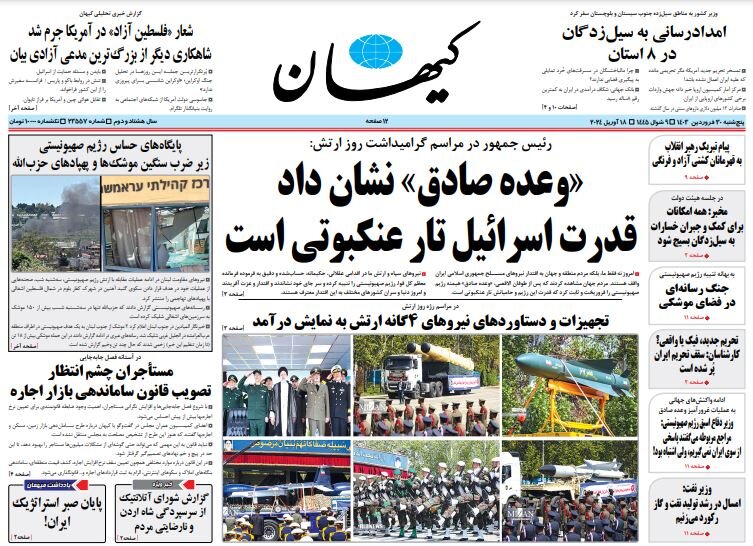The end of Iran's strategic patience

TEHRAN - Kayhan devoted its editorial to Iran's rights and legal response to the insolent attacks by the usurping regime.
It wrote: Iran showed restraint with its strategic patience in the face of Israel's insolent attacks on its advisors and forces for more than six months and showed the main policy of the Islamic Republic is the non-expansion of war and tension in the region. But on the one hand, international organizations, especially the United Nations Organization, could not respond to Israel's crime under Article Seven and restrain this rogue regime; on the other hand, Iran's strategic patience did not reduce tensions and Israel abused this Iranian policy with the green light of the U.S. and crossed the red lines of the Islamic Republic and showed that it still wants more tension. Therefore, Iran had to punish Israel to prevent further tension by the Zionist regime. So, in reality, Iran's response is a stabilizing response to rein in Israel and in the direction of regional stability, and it showed that Iran's strategic patience and threshold of tolerance has come to an end and it is no longer a spectator.
Iran: Oil sanctions boomerang against Biden
In an analysis, the Iran newspaper discussed Biden's difficult situation vis-a-vis Iran and said: The future behavior of the United States in supporting Israel following Iran's military action indicates further sanctions against Iran. According to the Reuters news agency, Iran's recent response to the Zionist regime probably will not cause the Biden government to impose more severe sanctions against the country's oil exports, and the reason for that is the concern about rising oil prices and angering China as Iran's largest oil buyer. Biden, who is currently facing unfinished work such as the Ukraine war and Tel Aviv's military actions in the Gaza war, is not able to do something in the crucial months ahead of the presidential election because it is considered a meaningful anti-China behavior on the one hand, and it has a drastic effect on the prices of energy, and as a result provides the basis for internal dissatisfaction in America. It is in such a situation that observers believe that the attempt to intensify sanctions on Iran's oil exports will create an irreparable challenge at both the domestic and foreign levels, and could be a factor in further destabilizing Biden's position in the upcoming elections.
Shargh: Tel Aviv’s trap for Washington
In an interview with Jalal Mirzaei, a university professor, Shargh pointed out Israel's position towards America and wrote: As time passes since Iran's response to Israel, along with the expansion of Tel Aviv officials' positions, the Western media have also raised numerous speculations about the possible Israeli attack. Netanyahu will try to tie the issue of Israel's response or possible attack on Iran to his requests for the management of the Gaza war, and the position of a counterattack is probably ruled out, and we are only facing political and media blackmail. According to the series of developments in the region and also considering the serious efforts of the United States of America and some European countries, now the pro-Tel Aviv axis is looking to control and manage the tension. Netanyahu is deliberately trying to put Iran on the path of war so that eventually America will get involved in this conflict. Netanyahu wants the situation to progress to the point where the direct intervention of the U.S. and other Western countries against Iran becomes inevitable, and this is Netanyahu's ideal scenario. Therefore, it can be said that the shadow war is now coming out of the shadows.
Ham Mihan: Opportunity to negotiate?
In an interview with Hassan Beheshtipour, a foreign policy analyst, Ham Mihan discussed the revival of negotiations with the United States in the situation of heightened tensions with Israel. The paper said: The United States and Israel differ on various issues, but these two are strategic allies. This means that they have a strategic alliance with each other in various aspects including political, military, economic, cultural and social. They also disagree on the issue of war with Iran. America does not want to enter Israel's adventure; in fact, the dispute between America and Israel over Iran is tactical, not strategic. Iran gave its appropriate response after Israel attacked its consulate in Damascus, and now it is time to enter into direct negotiations with the United States because it is in the best position for negotiations, and now no one will be accused of compromising because of such negotiations. It is wise to negotiate in the current situation where we are in a good position militarily. There are two facts now; firstly, America and Israel have serious differences of opinion about attacking Iran, and secondly, Iran can take advantage of such an atmosphere by using diplomatic tools.
Leave a Comment